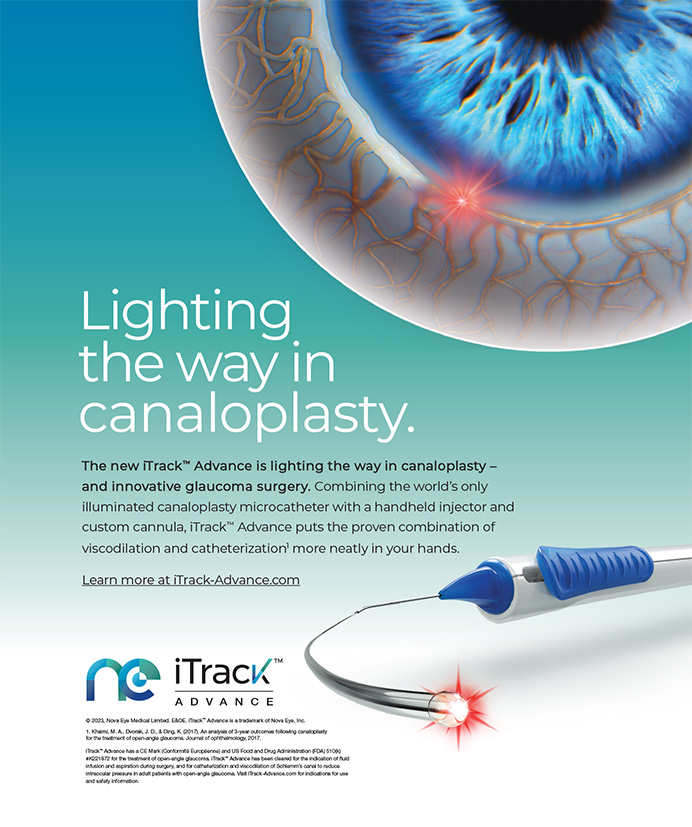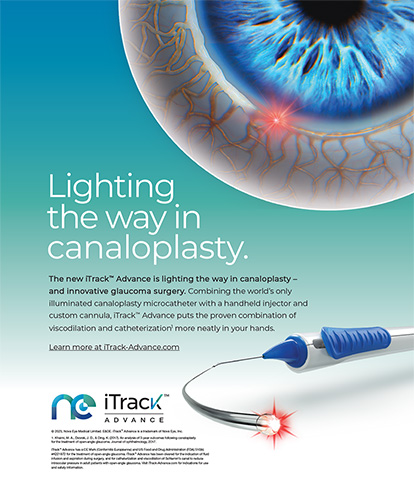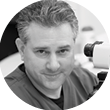
Pursuing dual passions in music and medicine has shaped my unique career, a narrative filled with dedication, perseverance, sacrifice, and fulfillment.
A MUSICAL INTRODUCTION
In 1962, as the Beatles and Rolling Stones were setting the rhythm of the era, my musical journey began in our San Francisco home, where a piano—included with the house purchase—became my first instrument. My musical tutelage advanced significantly in Mexico City under José Luis Córdova-Casillas, a noted Mexican concert pianist. He introduced me to Bach’s structured harmonies—a significant precursor to jazz.
After my parents’ divorce, my mother, Erika, pursued a Master of Fine Arts in playwriting at the University of California, Los Angeles. Meanwhile, my father, Jerome, accepted a research director position at Richardson Vicks in Paris. Consequently, I attended Orley Farm School, an English preparatory institution in Harrow. Reflecting on this period, I often quip, “Though it was 1974, it felt more like 1874.”
I arrived at Orley Farm with a proficient piano background, thanks to José Luis in Mexico City. The music teacher there, however—Mr. Lewis—displayed a traditional approach. He met my suggestion to learn the saxophone as a second instrument with skepticism—“I said a second instrument,” he retorted!
Within the next 6 months I had moved on to Leighton Park School in Reading, a Quaker secondary boarding-school. There, a dynamic and open-minded music master, Peter Allwood, responded to my same request to learn the saxophone with a resounding, “Splendid idea!”
Among its many music professors, the school had two particular instrumental teachers who taught classical clarinet and trumpet. Both were also gigging jazz musicians. My saxophone lessons with Cyril Reuben were filled with excitement because at that time the saxophone was not taught in a high school setting in the United Kingdom. Cyril Reuben’s lessons with me led several accomplished clarinetists to switch to the saxophone. With the untapped talent of Freddie Coop, a former lead trumpet of the BBC Jazz Orchestra, Leighton Park School became the first in the United Kingdom to have a small ensemble Dixieland band and a full 17-piece big band. Our success led to a recorded vinyl record in 1978—another first in British education.
A TWIST OF FATE
A rugby injury led to an encounter with orthopedic surgeon and jazz saxophonist Arthur Edward George Themen, MD. This meeting revealed the feasibility of melding a medical career with a passion for jazz. During my teenaged years, I wrestled with the ambition to be a jazz saxophonist and the daunting prospect of reaching the prowess of my musical idols. This dilemma influenced my decision to pursue a medical career, with an aspiration to maintain my saxophone skills at a commendable level among accomplished jazz musicians. I never wanted to hear, “He’s a really good jazz musician … for a doctor.”
CAMBRIDGE AND BERKLEE: A HARMONIOUS BLEND
Securing a spot at Cambridge for medicine was challenging, but I believe that my dedication to jazz played a significant role. The support from my professors was made evident when they approved a deferral of my clinical training to study jazz at Berklee College of Music, Boston. The intensive musical training at Berklee proved advantageous in my later surgical training (Figure 1).
Studying under renowned musicians such as Gary Burton, Dave Mash, Billy Pierce, Tim Hagans, Greg Hopkins, and George Garzone enriched my experience. Informal interactions with fellow students—many now leading jazz figures, including Tommy Smith, Vana Gierig, Jamshied Sharifi, Robert Bonisolo, Michael Rosen, Kai Eckhardt, Warren Hill, Mike Ringquist, Skúli Sverrisson, and Dag Kristofferson (Figure 2)—and private sessions with Jerry Bergonzi, a world-class jazz artist and educator, were invaluable.
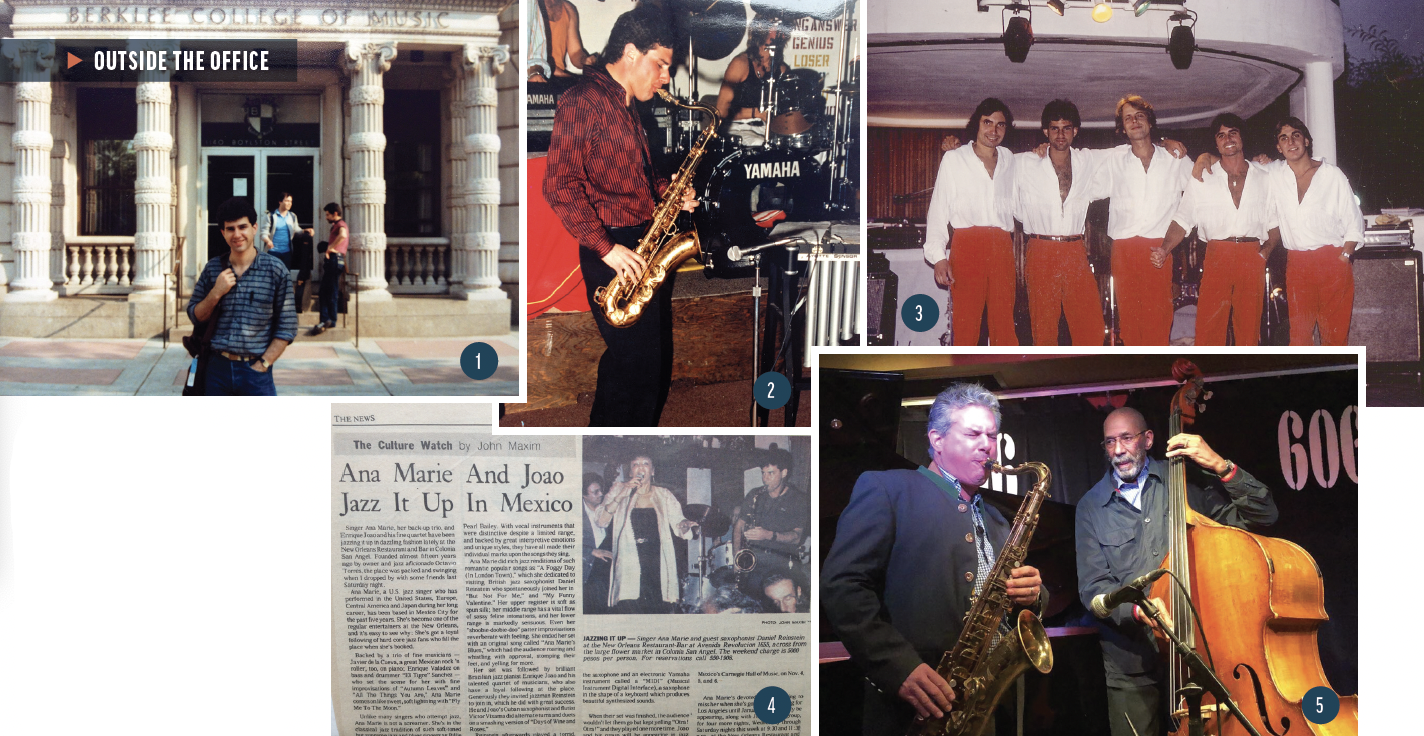
Figures. Dr. Reinstein at Berklee College of Music, Boston (1). Club Med Copper Mountain with a student band during his studies at Berklee College of Music (2). Dr. Reinstein working a summer job in the house band at Club Med Al-Hoceima, Morocco (3). Newspaper clipping featuring Dr. Reinstein performing saxophone alongside singer Ana Marie at the New Orleans Jazz Club in Mexico City, 1988 (4). Dr. Reinstein playing alongside legendary bass player Ron Carter at London’s 606 Club in Chelsea (5).
One winter morning at Berklee, feeling disheartened, I confided in Billy Pierce about my perceived inadequacy. His response transformed my perspective: “If they sound good, they’re not practicing; they’re playing what they already know. If you sound bad, it’s because you’re attempting something new, something you haven’t yet mastered. That’s how you’ll learn.” This philosophy profoundly influenced my subsequent surgical training.
Returning to University College London after Berklee, I noticed my medical training remained intact, motivating me to pursue a further 2-year diploma at Berklee. With the support of my mentor, David Rickards, FRCR, FFRDSA, and Dean Arthur Miller, MD, I embarked on this unique academic journey.
After Berklee, with enhanced musical skills, I was able to perform with professional jazz artists (Figures 3–5). Continuous learning and feedback from seasoned musicians have been integral to my growth, allowing me to enjoy the essence of improvisational music.
In 2002, I established London Vision Clinic with Craig Engelfried, who also attended Orley Farm School in 1974. The clinic has since become a leader in academic refractive surgery, with more than 200 peer-reviewed publications and numerous collaborations with Carl Zeiss Meditec. My musical journey continues with regular performances at venues such as the 606 Club in Chelsea and Ronnie Scott’s Club, where I share the stage with renowned jazz musicians (Figures 5–7).
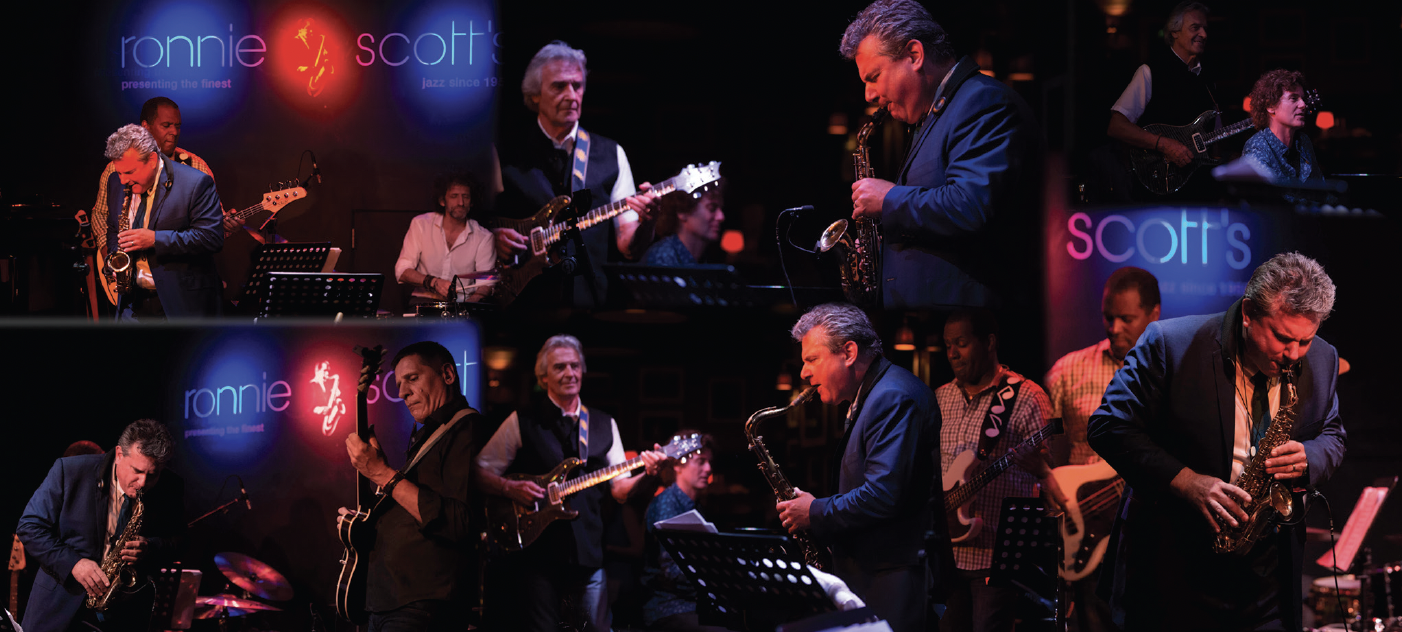
Figure 6. Dr. Reinstein playing with jazz guitar idol John McLaughlin (guitar), Vana Gierig (piano), Morris Pleasure (bass), Bertrand Fouriner (guitar) and Jojo Mayer (drums) at London’s Ronnie Scott’s Club, 2014.
BALANCING DUAL PASSIONS
The fusion of my musical and medical endeavors was a product of creativity, serendipity, vigilance toward emerging opportunities, and sheer determination.
Reflecting on my teenaged years, I often recount my uncertainty of ever attaining jazz excellence, my initial aspiration—or plan A. As a humorous alternative, I formulated a plan B: pursue a career in ophthalmology with a focus on corneal and refractive surgery and aim to invent an effective presbyopia treatment to benefit my musical idols.
Plan B unfolded successfully following my residency at Mount Sinai in New York, refractive surgical fellowship in Vancouver, and corneal training at the University of British Columbia.
My quest for an advanced presbyopia treatment culminated in the creation of Presbyond in 2004, later commercialized by Carl Zeiss Meditec in 2009. This innovation has facilitated interactions with numerous jazz and pop icons, rewarding me with a harmonious blend of my medical and musical worlds. Through Presbyond, I have had the privilege of treating and forming personal connections with jazz legends such as Chick Corea, Ron Carter, John McLaughlin, Randy Brecker, Peter Erskine, Bill Cobham, Bill Evans, Branford Marsalis, Bela Fleck, Robben Ford, and Eric Marienthal. In the pop realm, I have treated Ed Sheeran, Keith Richards, Tom Coster (of Santana), Steve Smith (of Journey), Bonnie Tyler, and Brian Bennett (of The Shadows; Figure 7).
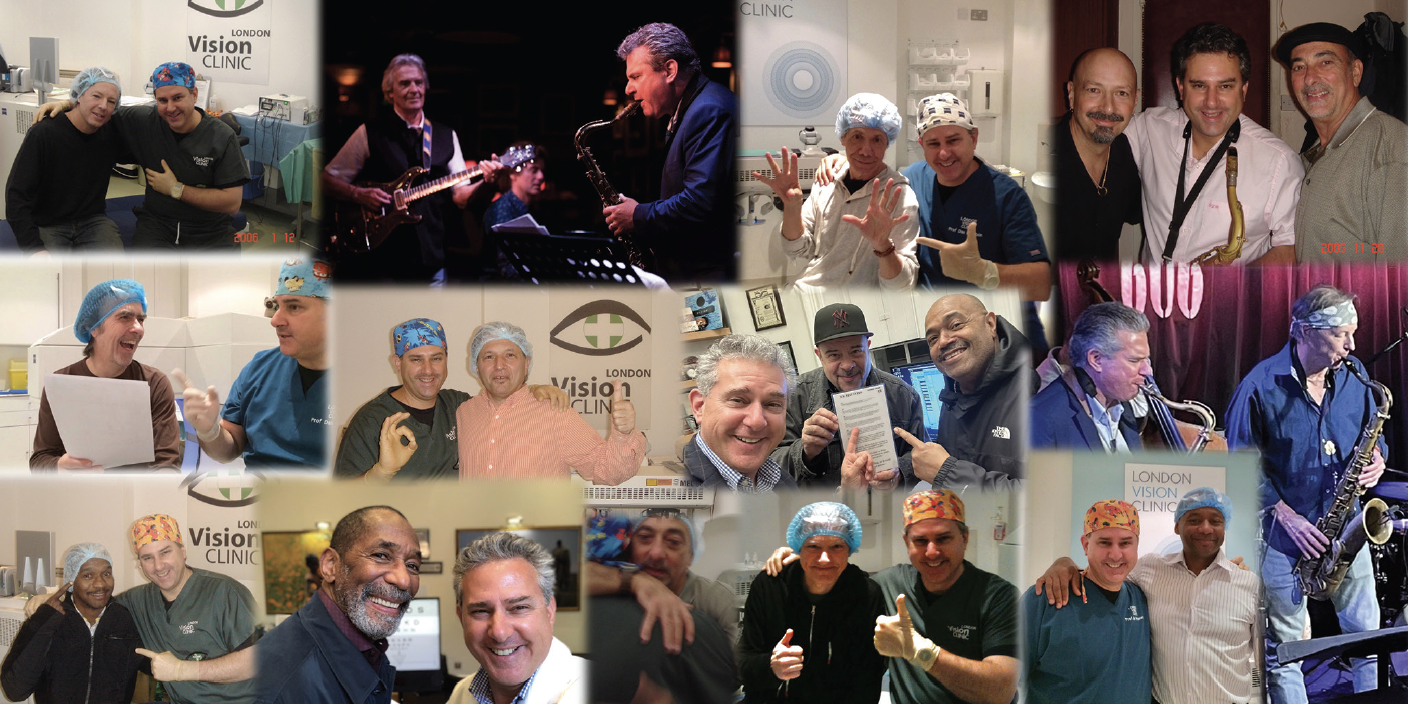
Figure 7. Top row (from left to right): Bill Evans (saxophone), John McLaughlin, Chick Corea, Steve Smith, and Tom Coster. Second row: Dean Brown, Jerry Bergonzi, Bob Franceschini, Dennis Chambers, Bill Evans. Third row: Victor Bailey, Ron Carter, Tom Coster, Robben Ford, Branford Marsalis, Bill Evans (pictured at the 606 Club).
Performances at the annual ESCRS meetings, especially at top European jazz clubs, have been a highlight. A standout moment was playing at Ronnie Scott’s with my Laser Blended Vision band during the 2014 ESCRS in London and featuring acclaimed musicians and fellow Presbyond recipients (Figure 8).
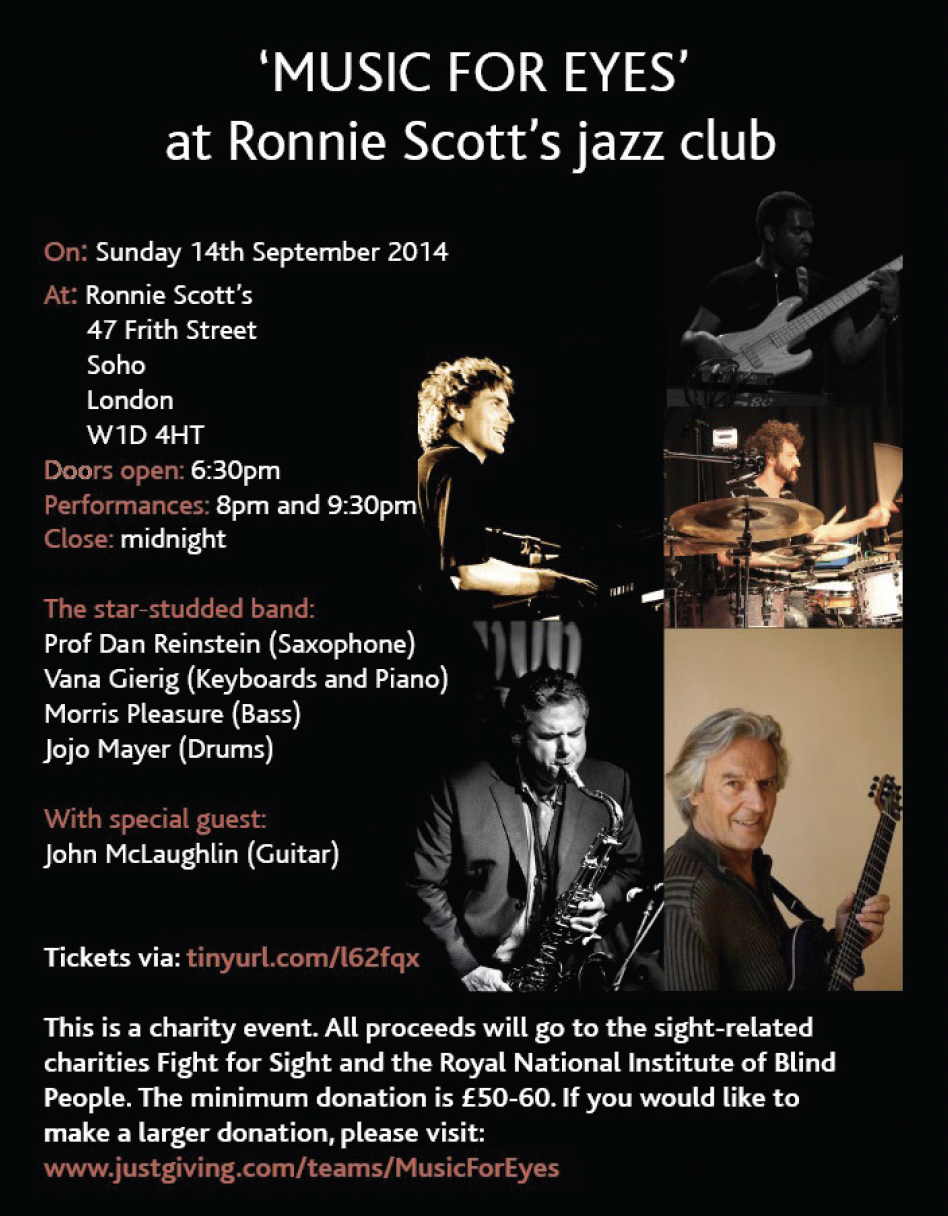
Figure 8. Flier for the Laser Blended Vision Band “Music for Eyes” concert at London’s Ronnie Scott’s Jazz Club, during the ESCRS 2014.
The close bonds formed with my musician patients, many evolving into close friendships, have immensely enriched my practice in refractive surgery. The ability to gift sight to those whose music has inspired me offers an indescribable reward.
HARMONIZING MUSIC AND MEDICINE
My dual passions for music and medicine have consistently enriched my life and career. Music provides an emotional outlet and enhances my medical skills, while my clinical practice offers a methodical perspective to my musical endeavors. The mental agility and creativity necessary for jazz improvisation are akin to the skills required for surgical research and on-the-spot decision-making in the OR. While music serves as a refuge from the rigors of surgery, my medical background brings a scientific and analytical approach to my musical pursuits. The principles of dedication, discipline, and perseverance, honed through music, have been invaluable in enhancing my surgical skills and spurring medical innovations.
Our family narrative mirrors this unconventional blend. Guided by a dedicated and qualified veterinarian mother, our children are carving their unique paths across music, medicine, and academia.
CONCLUSION
Ultimately, my dual love for music and medicine has led me to the profound sense of never having worked a day in my life. This unique journey has instilled a profound sense of fulfillment and gratitude for the support from my parents, teachers, and professors. The opportunity to interact with and contribute to the lives of numerous extraordinary artists through my medical expertise has been a gratifying blend of my dual passions.

